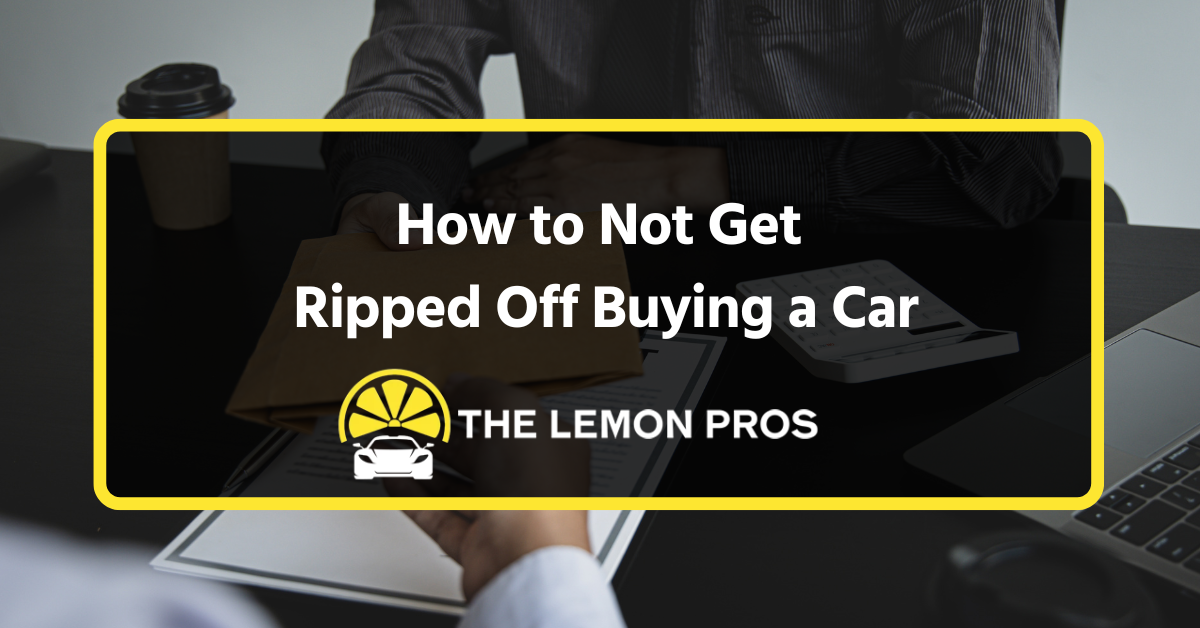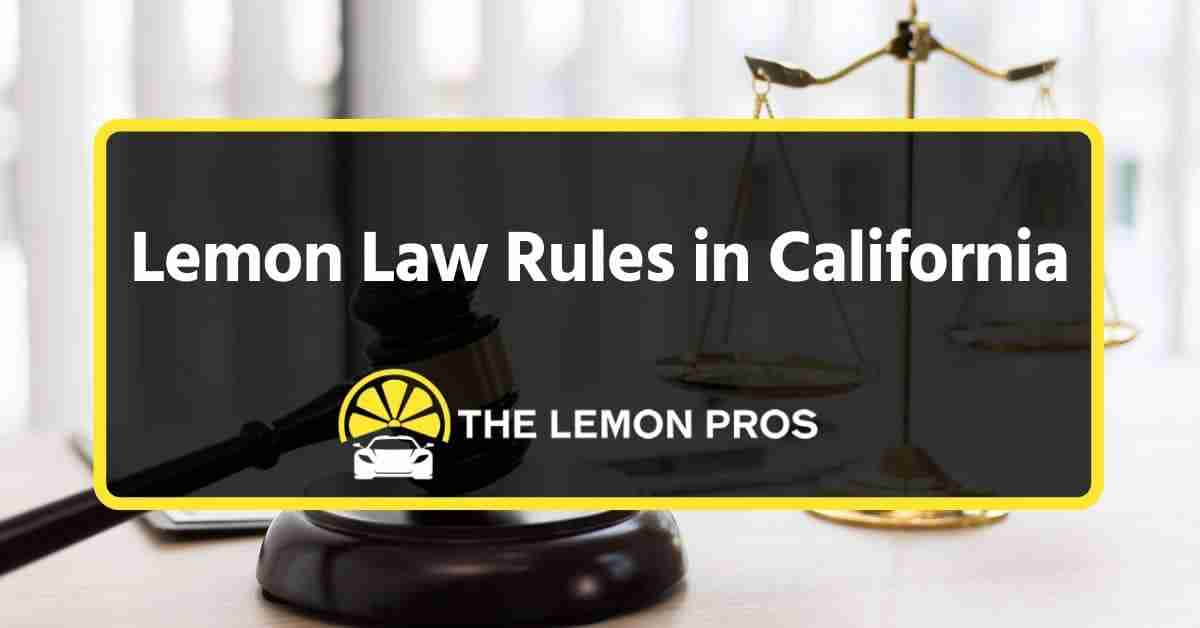
How to Not Get Ripped Off Buying a Car
Buying a car can be an exciting time in anyone’s life, but it can also be overwhelming. There’s a lot to pay attention to, from the condition of the car to the financing payments. You don’t want to become one of the many victims of car-buying scams or overcharges.
If you want to know how to not get ripped off buying a car, you need to start by paying close attention to the deal. Do your research and know your rights as a car buyer. Learning how to negotiate and watching out for hidden fees can also help you avoid disaster.
The Lemon Pros protect consumers who have been taken advantage of during a car sale. With a practice area focused on dealer fraud and lemon cars, we have the experience needed to defend your rights. Contact us for a free consultation to get personalized advice for your situation.
In this guide, we will cover how to avoid buying a lemon car and give you some practical tips to help you along the way. If it’s too late, we will also discuss why you may want a lawyer for car problems.
Table Of Contents
How to Not Get Ripped off Buying a Car in California?

You can prevent getting ripped off by car dealers with minimal effort. Follow these suggestions to protect your rights.
Research Is Your First Line of Defense
Whether you are buying a new or used car, you want to start by looking at the purchase price. You should always know the car’s value, which you can check with tools such as KBB, Edmunds, and NADA.
Aside from its book value, you can also research the price of similar cars in your area by seeing what other dealers are selling. Make sure you are looking at comparable models with the same trim, mileage, and features.
This is a good time to decide on the type of car you want to buy. You can weigh your options between new and used, or buying a car from a dealership or a private seller. Once you’ve decided which model to go with, check for open recalls and issues with the model through the National Highway Traffic Safety Administration (NHTSA).
Know Your Legal Rights as a Car Buyer in California
The California Department of Transportation (DMV) supplies consumers with a valuable Car Buyers Bill of Rights. Among the most notable points are the following rights you should know about:
Right to Clear and Honest Advertising: Dealers must not engage in false or misleading advertising about the car’s condition, price, or financing terms.
Right to a Written Contract: You must receive a detailed, written purchase agreement that outlines the exact price, fees, financing terms, and any warranties or add-ons.
Right to Disclose Vehicle History: Dealers are required to disclose known defects and accident history on used cars, often through vehicle history reports, such as CARFAX.
Right to a Cooling-Off Period (No General Right to Cancel): Unlike some purchases, car sales in California generally do not have a “cooling-off” period. You usually cannot return a car just because you changed your mind. Read the contract carefully and ask questions before the process is complete.
Right to Review the Buyer's Guide (for Used Cars): Federal law requires dealers to display the FTC Buyer's Guide on used cars, which explains warranties and whether the car is sold “as-is.”
Right to a Warranty or Implied Warranty: If the car is sold with a warranty, it must be honored. Some used cars may come “as-is,” meaning no warranty. Be sure to clarify.
Right to Cancel Add-On Products: You have a limited time to cancel certain optional products, like extended warranties or service contracts, if purchased separately.
Above all, you have the right to file a Lemon Law claim through California guidelines (Song-Beverly Consumer Warranty Act) in some situations. If your new (and sometimes used) car suffers from serious defects that impair its use, safety, or value, AND you’ve given the manufacturer ample time to repair the problem, you may be entitled to a refund or replacement vehicle. You may also have the right to sue a car dealership.
Secure Financing Before You Shop
The easiest option is dealership financing, but that’s not always going to provide you with the best deal. Yes, going this route will help you get in and out of the dealer the fastest, but we always encourage you to explore the options available – either from your credit union, a local bank, or through other reputable lenders.
Getting pre-approved through a bank or credit union gives you the upper hand. It helps you lock in a competitive interest rate, know your budget ahead of time, and avoid costly dealer markups. Pre-approval also strengthens your negotiating power since the dealer sees you as a serious, ready-to-buy customer.
If you choose to finance with the dealership, watch out for inflated interest rates. Dealers will add a markup, known as the dealer reserve. This amount is added to the interest rate quoted by lenders and can lead to you paying hundreds or thousands more during the life of the loan.
Watch for These Common Car Dealership Tactics

Not every car dealership does honest business. That’s important for you to know before you start shopping. If you see any of these common tactics used, you may want to consider shopping elsewhere.
Payment packing: Extra products, such as extended warranties, service contracts, or gap insurance, are bundled into your loan with out clearly itemizing the costs. The dealer makes the monthly payment look affordable, but the overall price of the deal is quietly increased.
Yo-yo financing: This common scheme used with used car sales is focused mainly on consumers with poor credit. The dealer allows you to take the car home with the impression that the financing is approved. Days later, the dealer calls back, claiming the deal fell through and demands you return the car or accept a new loan with worse terms.
Bait-and-switch pricing: Dealers advertise a car online at a low price that draws you in. Then, when you arrive, they claim the vehicle has been sold or is no longer available, trying to steer you toward a more expensive option.
Selling unnecessary add-ons: Most dealers will offer some add-ons, but there are many that are completely unneeded by the average consumer. Nitrogen-filled tires, VIN etching, and paint protection may have a purpose, but the dealer will offer them for far more than they are worth.
It’s also wise to avoid any dealership that’s putting too much pressure on you. If the salesperson says, “This deal won’t last,” or “someone else is coming to buy it later today,” you are being rushed into a decision. The dealer doesn’t want you to think things through, which is a big warning sign.
Inspect the Vehicle Carefully
No matter how well the dealer makes the car look to you, it’s important to perform your own inspection. You can ask for a pre-purchase inspection from a third-party mechanic, especially if you are buying a used car.
Make sure every major component is inspected, including the tires, brakes, steering, suspension, and undercarriage. Even with a new car, you want to check the odometer, inspect the factory stickers, and look for any signs of transport damage.
Finally, check the vehicle history, either through CARFAX or AutoCheck. With a used car, you want to compare odometer readings, look for any open recalls, and evaluate if there’s been previous accident damage. Additionally, you want to know that the vehicle is free of a branded title, which could indicate that it was involved in a flood, is a lemon vehicle, or was considered salvage from a major accident.
Negotiate Smartly
While it’s great to know the monthly payments, it’s essential to understand more than what you are paying for the out-of-the-door price. Ask for detailed documentation of the down payment, interest rates, trade-in, and monthly expenses. All of this should be totaled up so you can see exactly what you are spending on the car over time.
Additionally, you should negotiate on each of these points. Instead of negotiating on the monthly payments, work on getting the most for your trade-in, reducing the car price, and getting better financing. At worst, you could also sell the car privately instead of trading it in, thereby giving you more to spend on a newer vehicle.
Be wary of any last-minute manager approvals and be ready to leave, if necessary. You have the power to walk away, which makes you the most important person in the negotiation.
Don’t Get Blindsided by Fees
Before you finalize the deal, get more information about all the finer details. Ask about dealer prep fees, documentation fees, extended warranties, and gap insurance. There could also be a markup on taxes and registration. Many of these items are overpriced and can be negotiated or declined.
What to Do if You’ve Been Scammed Buying a Car

Whether you are the victim of odometer fraud or are dealing with unrepairable defects on a car you recently purchased, you may be able to take action and get compensated. Here are some important steps to remember.
Contact the dealership immediately. As soon as you realize there’s a problem, you want to speak with the dealership’s management or the manufacturer’s customer service.
Gather all documentation. Keep records of everything that’s occurred. You should have the purchase contract, financing documents, receipts, repair orders, and any communication with the dealer.
File a formal complaint. You can report the issue with the California Department of Consumer Affairs and the California Attorney General’s Office.
Reach out to the Better Business Bureau (BBB). To warn other consumers and to help mediate disputes, be sure to file a complaint with the BBB.
Consult a California Lemon Law attorney. Before you attempt to negotiate or resolve the issue on your own, get a free consultation with an experienced Lemon Law attorney. In some cases, you may only need to file with the small claims court.
Report all fraud to local law enforcement. If there has been intentional fraud or any laws broken, you want to notify local law enforcement agencies. A lawyer can help you determine if this is appropriate for your situation.
Do You Qualify for California Lemon Law Protection?
You might be wondering how to know if you have a lemon. In California, there are specific criteria that your car must meet:
- Vehicle must be covered under the manufacturer’s original warranty
- Substantial defect must impair the use, value, or safety of the vehicle (many common car problems can be included in this description)
- Defect must first occur within 18 months or 18,000 miles, whichever comes first
- You must have allowed a reasonable number of repair attempts (typically 2-4) with no success, OR the vehicle must be out of service for a total of 30 or more days related to the same defect
While you may be tempted to try and work out a settlement with the manufacturer or dealer yourself, you should always have a Lemon Law lawyer protecting your rights.
Need Help After Being Ripped Off Buying a Car?
No one deserves to be ripped off after spending hard-earned money, yet some dealerships are more focused on profit than on doing what’s ethical. If you feel you’ve been ripped off by a dealership, you need to take action promptly to protect your rights. With help from an expert, you may be able to get compensation for your troubles.
The Lemon Pros want their clients to have quality cars, so they are set on defending those who were taken advantage of. As the best Lemon Law attorney, we know how to get compensation from dealerships and manufacturers. Visit us today for a free case evaluation.
FAQ
Wondering what else to do so that you will avoid being ripped off? We've answered some of the most burning questions regarding car purchase.
Is It Better to Buy a New or Used Car?
New cars offer more reliability and often have superior warranty protection. However, it may be more affordable to purchase a used car, especially if you are paying cash. Even with an old car, you can get extended warranty protection from a third-party provider if you want the extra coverage. You just need to carefully inspect the car before purchasing and make sure to purchase it from a reputable dealership to avoid being scammed.
How to Know if You’re Getting a Good Deal
You must do your homework before buying. Check the vehicle’s market value and compare it with other models in the area. Make sure you review the final price (including taxes, extra fees, and add-ons) before signing any agreement.
How Do I Check a Car’s History Before Buying?
You want to take the vehicle identification number (VIN) and run it through CARFAX or AutoCheck. A vehicle history report tells you about major accidents and car recalls. It will also tell you if the vehicle was a lemon or has been declared a salvage car.
How Can I Determine the Fair Market Value of a New or Used Car?
Most people prefer to use online tools, such as KBB, Edmunds, and NADA, to get the market value of a car. You can also compare it with similar models from other dealerships to see what would be considered a fair purchase price.
Is Dealership Financing a Good Deal?
At times, dealership financing can be a good deal, but only if you do your homework first. Dealers may offer lower interest rates through special promotions, especially if you have great credit. Compare it with offers from local banks and your credit union. If the dealer can’t match the pre-approved rate you receive, finance elsewhere.
Can You Decline Add-ons From Car Dealers?
Yes! You have every right to decline add-ons from the dealer. You may not need an extended warranty, VIN etching, service contracts, or paint protection. Even if you do, there’s a good chance of getting these services performed elsewhere without spending as much money. Ask for a complete breakdown of the cost, and don’t be afraid to ask them to remove unnecessary charges before you sign the contract. You are only obligated to purchase the car itself.






